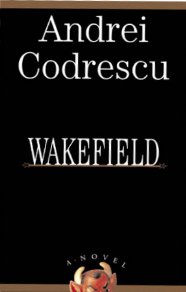Wakefield, Andrei Codrescu
 As I leaved through the first few pages of the book, I found two
references to Russian literature that are rather close to me.
The first was an overt mention of Bulgakov's Master and
Margarita. The second was less direct, a friend of the
protagonist, a poet, philosopher, and taxi cab driver called
Ivan Zamyatin, who shares a surname with the author of a book
banned by the Soviets of the name Мы.
As I leaved through the first few pages of the book, I found two
references to Russian literature that are rather close to me.
The first was an overt mention of Bulgakov's Master and
Margarita. The second was less direct, a friend of the
protagonist, a poet, philosopher, and taxi cab driver called
Ivan Zamyatin, who shares a surname with the author of a book
banned by the Soviets of the name Мы.
Wakefield is the story of a man who wasn't ready to go when the devil came to take him. Wakefield is the man who wasn't ready; he lost his way, didn't find his real life, and, well, he just wants another chance. So he makes a deal with the devil: he has to get out in the world and find his real life. He has one year to do the deed, and he needs to bring back a gift from each place that he visits, an object that will help to prove that he has found his true life.
Wakefield is an author of travel books; he lectures on travel, art, money, architecture, and pretty much anything that people will pay him to talk about. This gives him plenty of opportunity for travel, plenty of places—typical and not—to visit, and plenty of people to get to know. Not being one to prepare his talks ahead of time, Wakefield also has plenty of opportunity for taking inspiration from his hecklers and being just as surprised by the contents of his talks as his audience.
While most of us have not consciously made a deal with the devil, the fact is that most of us do wander through the events of our days in search of our real lives. Of all of the options we have before us, why do we make the choices that we do? Did we choose well? Have we been giving our attention to the things that will matter most to us when we find that we've reached the end of our days?
By allowing us to watch Wakefield as he deals with these fundamental questions, Codrescu gives us an opportunity to consider them for ourselves, in our own lives. If we're not happy with what we did yesterday, we can behave differently today.

